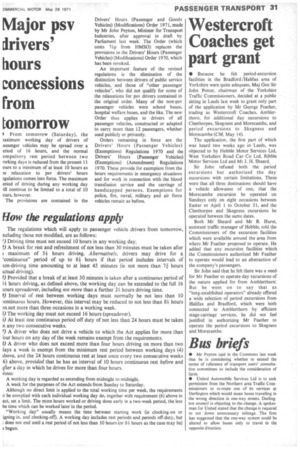Major psv Myers' hours mneessions rrom tomorrow
Page 39

If you've noticed an error in this article please click here to report it so we can fix it.
From tomorrow (Saturday), the taximum working day of drivers of assenger vehicles may be spread over a eriod of 16 hours, and the normal ompulsory rest period between two rorking days is reduced from the present 11 ours to a minimum of at least 10 hours as lie relaxation to psv drivers' hours .gulations comes into force. The maximum eriod of driving during any working day rill continue to be limited to a total of 10 ours, however.
The provisions are contained in the Drivers' Hours (Passenger and Goods Vehicles) (Modifications) Order 1971, made by Mr John Peyton, Minister for Transport Industries, after approval in draft by Parliament last week. The Order (which costs 7-.471 from HMSO) replaces the provisions in the Drivers' Hours (Passenger Vehicles) (Modifications) Order 1970, which has been revoked.
An important feature of the revised regulations is the elimination of the distinction between drivers of public service vehicles, and those of "other passenger vehicles", who did not qualify for some of the relaxations for psv drivers contained in the original order. Many of the non-psv passenger vehicles were school buses, hospital welfare buses, and the like. The new Order thus applies to drivers of all passenger vehicles, constructed or adapted to carry more than 12 passengers, whether used publicly or privately.
Orders remaining in force are the Drivers' Hours (Passenger Vehicles) (Exemptions) Regulations 1970 and the Drivers' Hours (Passenger Vehicles) (Exemptions) (Amendment) Regulations 1970. These provide for exemption from the hours requirements in emergency situations and for work in connection with the blood transfusion service and the carriage of handicapped persons. Exemptions for police, fire, naval, military and air force vehicles remain as before.










































































































